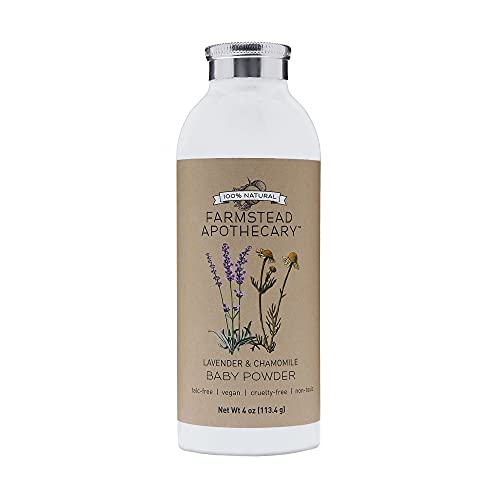At one time, baby powder was part of the hygiene routine for most young babies. The powder was synonymous with cleanliness and a fresh smelling baby. Even adults used it and loved it too! Who knew that one day parents would be searching high and low for alternatives to baby powder?
So, why the sudden need to jump ship? Unfortunately, new research emerged suggesting the powder does more harm than good. It’s been linked to cancer. That’s why I’ve compiled this article to discuss all you need to know about baby powder. What’s in it? How safe is it and also to give you alternatives.
How Safe is Baby Powder? Find Out What’s In It
Just how safe baby powder is depends on what exactly is found in the powder. Not all baby powders are unsafe to use on your little one. Its powders containing talc you need to be wary of. Why? Such baby powders — also known as talcum powders — have been known to cause serious health risks.
If the recent stats and lawsuits suggesting talc-based baby powder cause cancer are anything to go by, then it’s pretty disturbing news.
Studies show 20 – 30% of women who used talc-based baby powders were likely to develop ovarian cancer. The link between talcum powder and cancer isn’t entirely conclusive. But researchers have found traces of talc while examining tissue from ovarian tumor biopsies.
Aside from cancer, talcum powder is believed to cause respiratory illnesses. How? Manufacturers formulate it to stifle odors and absorb moisture. However, it can dry out mucous membranes resulting in pneumonia, asthma, or lung fibrosis. The risk of these illnesses occurring is even higher if your baby suffers from respiratory issues.
It’s understandable why parents would rather ditch talc-based powders and opt for safer alternatives with non-toxic ingredients. Because who wants to take chances with their little one’s health — and life?
Homemade Alternatives to Baby Powder
Fortunately, there are multiple alternatives to talc-based baby powders. Most of these alternatives are staples in your kitchen making them easily accessible and cheaper too. I’ll list a few examples below.
Cornstarch
This may be the right time to move cornstarch from your kitchen cupboard to your baby’s nursery! Firstly, cornstarch has the same consistency as baby powder. Secondly, it absorbs moisture just as effectively as baby powder.
Use it and your baby is left dry and comfortable for hours on end.
Baking Soda
It’s no secret that baking soda has countless uses around the house. The good news is you can add it to the list of useful baby products. It has deodorizing abilities and is safe to use on babies.
However, it may cause allergic reactions when used excessively and your child has extremely sensitive skin. I’d advise you to test on a small section of your baby’s skin to rule out any negative reactions.
Flour
Rice or oat flour can also do the trick as it works just as effectively as regular baby powder. It’s a little coarser than baby powder but safer nonetheless. And that’s what makes it a much better alternative to talcum powder.
Talc-Free Baby Powders: Brands to Choose From
Since talc is the culprit behind all these negative connotations regarding baby powder, simply look for products free from the substance. Thankfully, aside from homemade remedies, talc-free powders are available. And you can use them on your baby.
These powders are equally effective at absorbing moisture and most importantly, safer. Below are a few options.
California Baby

This is an organic baby powder you can use on your baby. Made of all-natural ingredients and free of talc & synthetics, you don’t have to worry about negative health implications
Talc Free Powder

A beautifully scented powder designed for both baby and mommy. It’s free from toxic substances that might cause your baby harm. Best of all, it’s pretty affordable. The powder contains essential oils which provide antimicrobial and antifungal properties
Nature’s Baby Organics Baby Powder

If you’re not a fan of scented baby powders opt for this fragrance-free baby powder. It’s an organic powder made of natural ingredients and works by absorbing moisture. Your baby will keep dry and comfortable throughout the day.
It also contains aloe and chamomile which can treat chaffing on irritated baby skin.
Burt’s Bees Baby Bee Dusting Powder

This is a lightly scented baby powder formulated to absorb moisture to eliminate dampness which causes the dreaded diaper rash. Along with keeping your baby dry, the powder acts as a mild deodorant to leave your baby smelling fresh and clean all day.
The powder is clinically tested and proven to prevent irritation when applied to your baby’s delicate skin.
Farmstead Apothecary 100% Natural Baby Powder

A lavender-scented powder that is safe to use on babies. It’s free from talc and other toxic substances that might cause your baby harm. Made of 100% natural ingredients, the powder is gentle on your baby’s skin ideally suited for sensitive skin.
FAQs
Can I get talc-free baby powder?
Thankfully yes. There are multiple talc-free baby powders available on the market. You’ll find them listed in this article.
Why is talc powder so controversial?
Talc powder is highly controversial because it’s been noted as one of the causes of cancer among other illnesses.
What are the health risks of talc powder?
Health risks associated with talc powder include lung and ovarian cancer as well as respiratory-related illnesses.
Final Thoughts on Baby Powder
Baby powder is generally safe to use. You just have to use the right one. My advice is to be vigilant and start reading the labels when purchasing your baby powder. Gone are the days when throwing baby powder into your trolley was done without giving the product as much as a second look.
You’ll need to take the decision-making process as seriously as you would when buying a mini-crib or playard! Steer clear from baby powders that are talc-based. Granted, the link between talc and cancer isn’t entirely conclusive. But if the 6,600 talc-related lawsuits are anything to go by, then using this product is not recommended.
Instead of taking chances with your baby’s life, rest easy knowing there are alternatives to the powder. And these include anything from home remedies to talc-free products. Or, you could make your own as outlined in this video.
Your choices are endless. Hopefully, this article will help you make the right decision for your child!
Last update on 2024-03-28 / Affiliate links / Images from Amazon Product Advertising API
